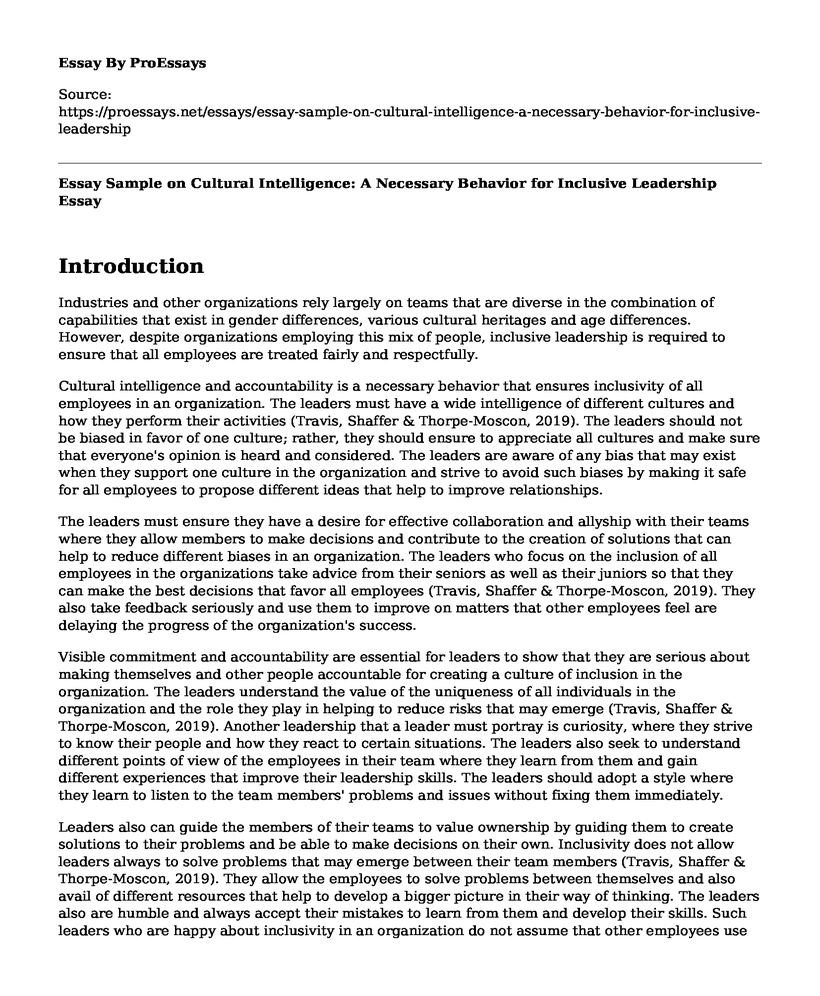Introduction
Industries and other organizations rely largely on teams that are diverse in the combination of capabilities that exist in gender differences, various cultural heritages and age differences. However, despite organizations employing this mix of people, inclusive leadership is required to ensure that all employees are treated fairly and respectfully.
Cultural intelligence and accountability is a necessary behavior that ensures inclusivity of all employees in an organization. The leaders must have a wide intelligence of different cultures and how they perform their activities (Travis, Shaffer & Thorpe-Moscon, 2019). The leaders should not be biased in favor of one culture; rather, they should ensure to appreciate all cultures and make sure that everyone's opinion is heard and considered. The leaders are aware of any bias that may exist when they support one culture in the organization and strive to avoid such biases by making it safe for all employees to propose different ideas that help to improve relationships.
The leaders must ensure they have a desire for effective collaboration and allyship with their teams where they allow members to make decisions and contribute to the creation of solutions that can help to reduce different biases in an organization. The leaders who focus on the inclusion of all employees in the organizations take advice from their seniors as well as their juniors so that they can make the best decisions that favor all employees (Travis, Shaffer & Thorpe-Moscon, 2019). They also take feedback seriously and use them to improve on matters that other employees feel are delaying the progress of the organization's success.
Visible commitment and accountability are essential for leaders to show that they are serious about making themselves and other people accountable for creating a culture of inclusion in the organization. The leaders understand the value of the uniqueness of all individuals in the organization and the role they play in helping to reduce risks that may emerge (Travis, Shaffer & Thorpe-Moscon, 2019). Another leadership that a leader must portray is curiosity, where they strive to know their people and how they react to certain situations. The leaders also seek to understand different points of view of the employees in their team where they learn from them and gain different experiences that improve their leadership skills. The leaders should adopt a style where they learn to listen to the team members' problems and issues without fixing them immediately.
Leaders also can guide the members of their teams to value ownership by guiding them to create solutions to their problems and be able to make decisions on their own. Inclusivity does not allow leaders always to solve problems that may emerge between their team members (Travis, Shaffer & Thorpe-Moscon, 2019). They allow the employees to solve problems between themselves and also avail of different resources that help to develop a bigger picture in their way of thinking. The leaders also are humble and always accept their mistakes to learn from them and develop their skills. Such leaders who are happy about inclusivity in an organization do not assume that other employees use the same approaches as they do to reach certain solutions. They also have a habit of asking team members about their failures and what they can do to improve them.
Conclusion
The most important aspect of a leader willing to ensure that there is the inclusivity of all members of an organization is courage. A leader with courage does not hesitate to make decisions and standing up to their principles. Even though the organization requires that leaders impose rules on their members, a courageous leader can stand up against such a policy and incorporate such behaviors to ensure the inclusion of all employees.
Reference
Travis, D., Shaffer, E., & Thorpe-Moscon, J. (2019). Getting Real About Inclusive Leadership Why Change Starts With You. Retrieved 9 February 2020, from https://www.catalyst.org/wp-content/uploads/2019/11/Getting-Real-About-Inclusive-Leadership-Report-2019-1-1.pdf
Cite this page
Essay Sample on Cultural Intelligence: A Necessary Behavior for Inclusive Leadership. (2023, Apr 04). Retrieved from https://proessays.net/essays/essay-sample-on-cultural-intelligence-a-necessary-behavior-for-inclusive-leadership
If you are the original author of this essay and no longer wish to have it published on the ProEssays website, please click below to request its removal:
- The Gender Perspectives of Non-Profit Organization Leadership: Could Women Leadership Make More Committed Followers?
- Red Star Macalline Group New Strategy Paper Example
- Strategic Management in Yamaha Paper Example
- Essay on Target: Cheap But Fashionable Retail Giant Growing Globally
- Working With a Culturally Diverse Staff: Benefits and Challenges - Essay Sample
- Paper Example on Johnson Toy: Jungle Jim, the Jogger - A Christmas Innovation
- Essay Sample on Emergency Response: Preparing Governments for Crisis







